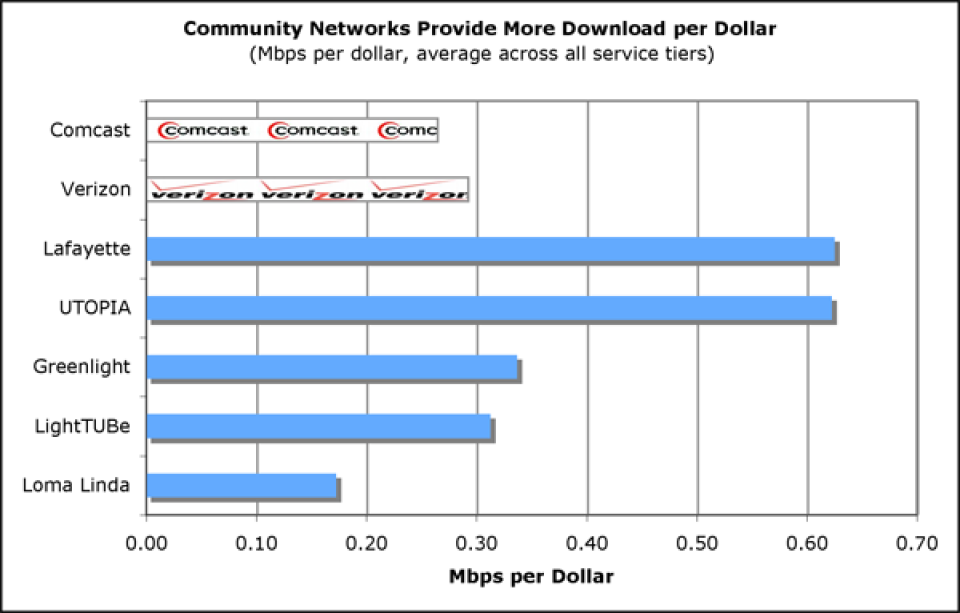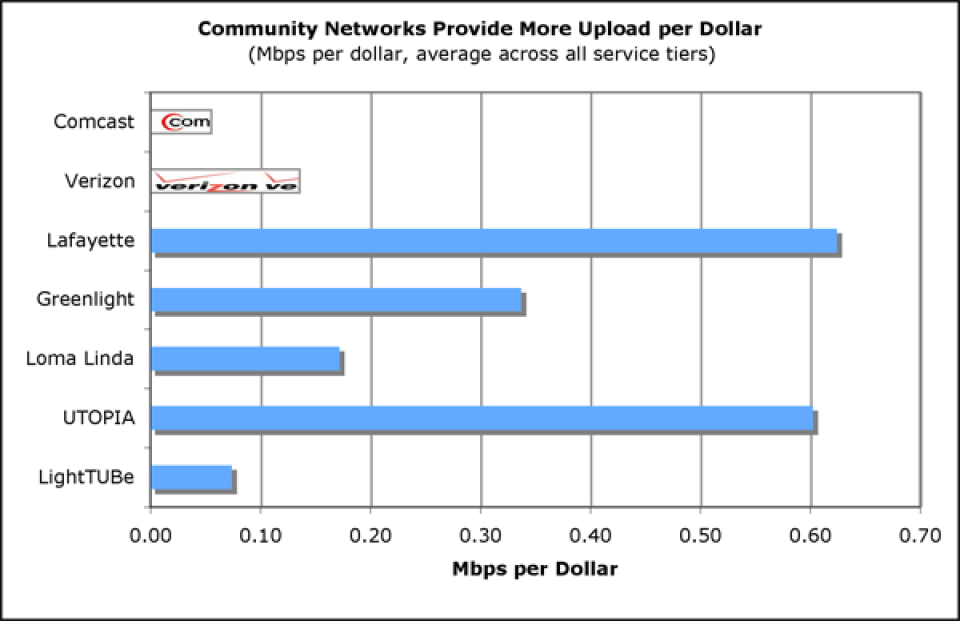Community broadband networks offer some the highest capacity connections at the lowest costs. Many of these communities, before building their networks, were dependent on 1.5 Mbps connections that cost hundreds of dollars, or less reliable DSL and cable networks. The community broadband networks below are full FTTH networks, so the advertised speeds are the experienced speeds -- unlike typical cable advertised speeds, which users pay for but rarely experience due to congestion on the shared connection. In comparing some of the fastest publicly owned broadband networks to some of the fastest national private sector networks, we found that the publicly owned networks offer more value per dollar. Update: A few weeks after this was published, Verizon upped its speeds and prices for several of the tiers.
The data we used is below. We thought about comparing also Qwest's "Fiber-Optic Fast" speeds, but their fastest upload speeds are below 1 Mbps, which makes them too pokey for the above networks.
Community Broadband Networks: The Best of the Best
Note: Speeds are expressed as Mbps Down/Up. Each network has distinct offering for each tier.
| | | Tier 1 | Tier 2 | Tier 3 | Tier 4 | |
|---|
| City | State | Notes |
|---|
| Lafayette | Louisiana | 10/10 | $28.95 | 30/30 | $44.95 | 50/50 | $57.95 | - | - | All connections come with 100Mbps connections to others on the local network. |
| Wilson | North Carolina | 10/10 | $34.95 | 20/20 | $54.95 | 40/40 | $99.95 | 60/60 | $199.95 | There is also a 100/100 tier for $299.95. These prices come from the bundled options. There is one unbundled option - 20/20 for $59.95 |
| UTOPIA | Utah | 15/15 | $39.95 | 30/30 | $49.95 | 50/50 | $59.95 | 100/100 | $147 | This is an open access network, 100/100 is not offered by all service providers |
| Tullahoma | Tennessee | 10/1 | $37.95 | 5/3 | $49.95 | 20/5 | $59.95 | 50/15 | $149.95 | There is also a 100/30 tier for $299.95 |
| Loma Linda | California | 5/5 | $29.95 | 10/10 | $49.95 | 15/15 | $99.95 | - | - | |
| Compare to the best from the private sector: |
| Comcast | DOCSIS 3 in MN | 1/.384 | $39.95 | 12/2 | $59.95 | 16/2 | $69.95 | 22/5 | 79.95 | A higher tier of 50/10 is available for $139.95/month. These are unbundled prices, bundling generally saves $15/month. Speeds are "up to" depending on neighborhood congestion. Comcast marketing makes it difficult to understand what speeds you are paying for. |
| Verizon | FiOS | 10/2 | $49.99 | 20/5 | $59.95 | 20/20 | $69.95 | 50/20 | $144.95 | These are unbundled prices - bundling with phone reduces monthly price by $5. FiOS is not available throughout Verizon footprint. |
The table reflects real rates, not short-term introductory rates. Do not be fooled into thinking that community broadband networks are able to offer the best deal because they are use taxpayer dollars. Very few community networks have ever used taxpayer money. Most networks are built using revenue bonds - which means that private investors fund the network, and are typically repaid over a period of twenty years using revenues generated by the services. Some cities choose to "back" the bonds with taxes -- which means that if the network does not generate sufficient revenue, the city will make up the difference with public money. Other cities choose not to back the bonds; this is a choice made by each community and impacts the interest rate on the bonds. In most cases, community networks have been safe investments that have not missed debt payments because the communities had an urgent need for broadband. In many cases, they have so many people wanting to take service, they have long lists for the installers. The idea that these networks frequently fail is an utter myth. However, not all community broadband networks offer the blazing speeds at great prices displayed above -- some were built five years ago, when those speeds were sufficient. Others do not feel the need to push the envelope, the community is content with what they have. However, they are able to meet higher demands if a citizen requires it. So even if a community network advertises its highest tier as being an 8/1, it is likely able to offer an even faster connection to those who need it. This is one of the many benefits of community broadband - the network is accountable to the community. The community broadband networks being built today almost always offer the fastest speeds currently available - as seen above with two ongoing builds, Lafayette and Wilson.





 Perhaps the most interesting aspect of the data are the baseline speeds available in Wilson North Carolina and Lafayette Louisiana. Lafayette offers a symmetrical 10Mbps connection for $28.95/month whereas Wilson charges $34.95.
I can only imagine how these networks have made their businesses more competitive while cutting telecom budgets for the schools and cities. Imagine being a business in Lafayette with a 50Mbps symmetrical connection when your competition is renting a T-1 at 1.5Mbps for $500/month. 30x the speed at 1/10th the cost. That is a competitive advantage.
In Utah, if Comcast has upgraded to DOCSIS 3 in that area, they'll be charging $140/month for a 50/10 connection when those in the UTOPIA footprint have access to a 100/100 connection for $147.
At least some communities across the U.S. are still competitive with the rest of the world when it comes to Mbps at affordable prices. There is still hope.
Perhaps the most interesting aspect of the data are the baseline speeds available in Wilson North Carolina and Lafayette Louisiana. Lafayette offers a symmetrical 10Mbps connection for $28.95/month whereas Wilson charges $34.95.
I can only imagine how these networks have made their businesses more competitive while cutting telecom budgets for the schools and cities. Imagine being a business in Lafayette with a 50Mbps symmetrical connection when your competition is renting a T-1 at 1.5Mbps for $500/month. 30x the speed at 1/10th the cost. That is a competitive advantage.
In Utah, if Comcast has upgraded to DOCSIS 3 in that area, they'll be charging $140/month for a 50/10 connection when those in the UTOPIA footprint have access to a 100/100 connection for $147.
At least some communities across the U.S. are still competitive with the rest of the world when it comes to Mbps at affordable prices. There is still hope.
